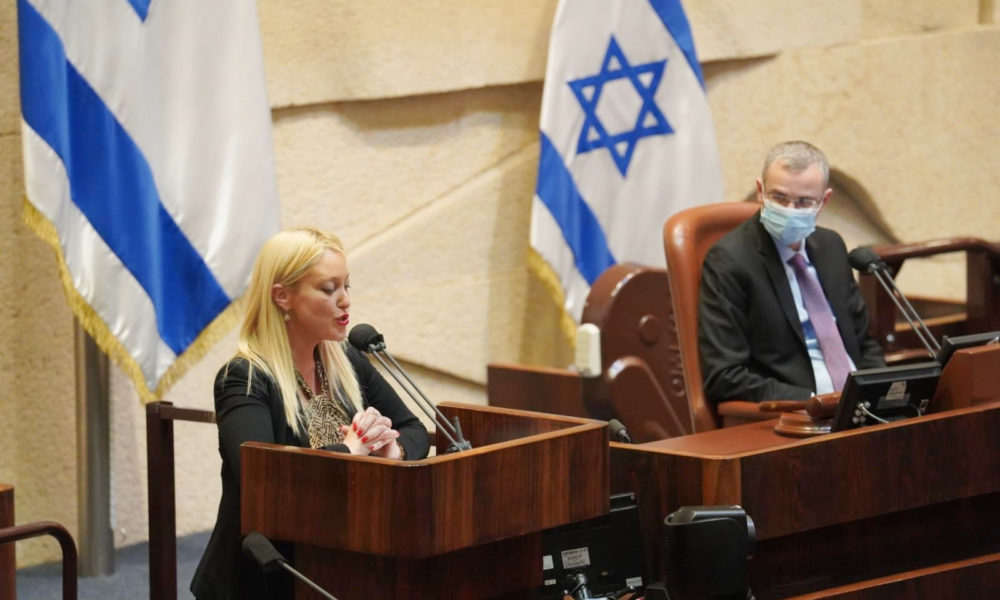Featured Item
From Cairo to the Knesset – with a SA connection

Albert Einstein said, “If you don’t believe in miracles, you are simply unrealistic.” This was a motto of late Israeli President Shimon Peres and is a mantra of his former advisor and now member of Knesset, Ruth Wasserman Lande.
Wasserman Lande – who lived in Cape Town from age nine to 17 – was hosted by WIZO South Africa in a Zoom discussion on 17 March.
She was approached by Benny Gantz, the leader of Kachol Lavan (Blue and White party) to be on its party list for the Knesset, and given 15 minutes to think it over. But she served just four days in January 2021, before being booted out by a former minister through the Norwegian Law. She soon regained her seat after another resignation from the Knesset.
Wasserman Lande showed a penchant for political organisation from a young age. When her father suggested moving to South Africa when she was eight, she corralled her third graders to demonstrate outside her parents’ home, to no avail.
“When I first went to Herzlia in Cape Town, I knew no English,” Wasserman Lande said. She grew up in a Russian-speaking family in coastal Ashdod in Israel. At Herzlia, she unsuccessfully tried to avoid studying Afrikaans as she knew she would make aliyah after school. Today, she is fluent in Hebrew, English, Russian, and Arabic. She admits that her Afrikaans is poor.
Wasserman Lande got permission to study before she went to the army in Israel. She served for three years and became an officer. She then entered the diplomatic corps and asked to be posted to Cairo.
“I wanted to go somewhere that wasn’t easy, but was strategic and where I could make a difference for Israel.” She did a crash-course in Arabic over four months, but soon had to adapt to the patois of the Egyptian street. “I was learning the culture and dynamics in a completely different world.”
“As a young, unmarried Israeli woman in Cairo, in the minds of most Egyptians, I was a representative of ‘the forces of evil’ that would do G-d knows what to the Egyptians. It was a very challenging three years. There may be a peace agreement, but there is little normalisation.”
Wasserman Lande said bringing Eli Amir, her favourite Israeli author, to Cairo was a highlight. She had to go over the head of the Egyptian minister of culture to the intelligence chief, and hosted more than 200 brave Egyptians at his lecture.
At the other end of the scale was coming home to find her apartment door slightly ajar, a subtle warning from the Egyptian authorities that she was constantly under surveillance. She had been spied on during salsa dancing lessons in the Cairo Hilton Hotel lobby.
She served as an advisor on Jewish diaspora affairs for Shimon Peres before joining the Federation of Local Governments in Israel, where she used her Arabic skills to connect with Israeli Arab communities. “Twenty-two percent of Israel’s citizens aren’t Jewish, but they are part and parcel of this country. My huge love of Israel makes me work for inclusion, mutual respect, and a change in the discourse, uniting people rather than excluding and disrespecting them. For a vibrant and viable economy and country, we need to include everyone.”
Wasserman Lande describes the atmosphere ahead of the fourth Israeli elections in two years as one of fatigue. “The key issue isn’t the economy, or the pandemic, or the conflict with the Palestinians. As it has been all along, it’s about saying ‘yes’ or ‘no’ to Prime Minister Benjamin Netanyahu.” She said she hated to bear bad news, but a fifth election wasn’t unthinkable, as many parties have already said they refuse to be in a coalition with Netanyahu.
Commenting on Israel’s recent strained relations with Jordan, she said both small countries were huge strategic assets for each other. “A stable, Jewish Israel was a strategic asset to Jordan even before 1948.” But relations have never been warm like those budding with Bahrain and the United Arab Emirates (UAE) under the Abraham Accords. Jordan wouldn’t allow Netanyahu to fly over its airspace, so he had to cancel a trip to the UAE.
“Israel hasn’t paid enough attention to nuance, which is very important in the Arab world,” she said. Jerusalem’s unilateral closing of the Allenby Bridge border post with Jordan to clamp down on coronavirus upset Amman. Jordan retaliated by shutting down the Sheikh Hussein crossing, stranding hundreds in the West Bank. Wasserman Lande was instrumental in helping 500 Jordanians to return home.
She described the Abraham Accords as an “absolute game-changer” and a “huge strategic achievement, regardless of what people think of Netanyahu and Donald Trump”.
Wasserman Lande is writing a novel titled Unveiled in Cairo, loosely based on her years in the Egyptian capital. It’s sure to be a rollicking read.
